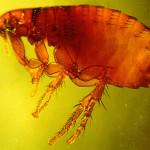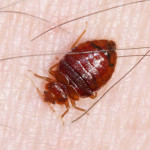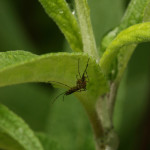- Cat flea
- Common bed bug
- Mosquitoes
Introduction • Fleas • Other biting insects and mites • Spiders • Mosquitoes • Other Outdoor pests
Introduction
Few things are as memorable as receiving a sharp bite or sting from an insect, spider, or other venomous arthropod. In fact, that’s the point! Arthropod venom is nature’s way of leaving a memorable impression on the target, including you.
Most arthropod venoms are painful to some degree. The black widow spider may have the potentially most toxic venom of any arthropod in Texas, but fleas, mosquitoes and (increasingly) bed bugs afflict more people on a regular basis. In addition, some biting insect, like ticks and mosquitoes, lack venom but can transmit disease. Hypersensitive reactions to stings or bites are probably a more important cause of human illness than the toxicity of venoms alone. In hypersensitive or allergic persons, the body’s immune system can provoke an irritating, medically serious, or even fatal reaction to a minor sting or bite. In addition, some arthropod bites can be a means of introducing an infectious pathogen. West Nile virus transmitted by mosquitoes, murine typhus spread by fleas, and Rocky Mountain spotted fever transmitted by ticks are examples.
Knowing something about the biology and control methods for these pests can reduce your risk of bites, stings, infections and allergic reactions. The following F@ctsheets provide information on a variety of stinging and biting pests that we commonly encounter in Texas.
Fleas
- Safer flea control (ENT-3001) – Options for controlling fleas safely and effectively on your pets.
- Controlling fleas (E-433) – Color guide to flea biology and control.
Spiders
- Brown recluse spiders (ENT-3003) – How to manage one of the most feared spider pests.
- Spiders (E-408) This publication describes common Texas spiders–both the good and the bad. Learn how to help prevent spiders from entering the home and how to handle those that do, with tips for professionals.
Other Biting Insects and other Arthropods
- Bedbugs – See our bed bug page
- Biting mites (ENT-3009) – Rodents and birds nesting in homes can bring tiny biting mites along.
- Conenose bugs (ENT-3008) – Secretive insects that feed at night on the blood of wild rodents, pets and even people. These insects also transmit a protozoan disease called Chagas’ disease which is explained in this video.
- Diagnosing mysterious bug bites (ENT-3006) – What to do when you think you’re being bitten, but can’t find the biter?
- Head lice (L-1315) – Did you know the name for being infested with head lice is pediculosis? Common among school-age children and often a difficult problem to resolve, this fact sheet will help. Also see information on lice from the Centers for Disease Control and Prevention, and Texas’ Department of State Health Service guidelines for head louse treatment in classrooms.
- Ticks – Ticks a concern? Check out our Tick App for information about tick biology, the different species of ticks, how to control, prevent bites and remove them.
Mosquitoes
- DIY Backyard Mosquito Control (ENTO-054 . Though cities provide basic mosquito control services for our communities, there are things individuals can do to reduce mosquito pressure around the home, including do-it-yourself and professional mosquito control.
- What Texans Need to Know About Zika (ENTO-052). Basic information about the disease that is capable of causing microcephaly in developing fetuses. What every traveler and every Texan needs to know.
- Zika Precautions for Women (ENTO-053). Women of childbearing age, especially anyone considering a Caribbean cruise or any trips to South or Central America or the South Pacific, need to read this.
- Mosquitoes and the Diseases They Transmit (B-6119). Mosquitoes are not only a nuisance, they are also important disease carriers. This publication describes the life cycle of mosquitoes, explains how to identify and control them, and discusses the diseases they transmit.
- Mosquito Safari Website. Go on a mosquito safari with this interactive AgriLife website. Mosquito Safari takes you on a walk through both urban and semi-rural landscapes to learn more about mosquito risks, biology and control options.
- Mosquito videos. Learn more about practical ways to make your home and landscape safer from mosquitoes, and see mosquito larvae breeding in a backyard setting.
- Frequently Asked Questions About Aerial Spraying. Are you concerned about West Nile virus, but also concerned about your city’s spray program? This update written during the 2012 WNV outbreak in Dallas attempts to answer some of the more common questions.
- CDC National Pest Alert brochure on West Nile virus. A short fact sheet on west Nile virus published by the leading public health agency in the U.S. government.
- CDC West Nile virus homepage. See statistics and maps, as well as lots of practical information for both citizens and vector control professionals.
Other Outdoor Biting and Stinging Pests
- Asps and other stinging caterpillars (ENT-3010) – Special hairs on the bodies of some caterpillars can cause a painful sting.
- Chiggers (E-365) One of the most irritating bites you can get comes from one of the tiniest of outdoor pests. Suspect chiggers when you get bites around your ankles, waist and areas of tight-fitting clothing.
- Scorpions (E-362) Scorpions are common in most of Texas. Their stinging behavior is unpredictable and individual reactions to stings may vary. This publication describes the life cycle, behavior and control of scorpions.
- Velvet ants (ENT-3004) The ant that’s not an ant.
- Wheelbugs and assassin bugs (ENT-1003) Although these insects are beneficial in the garden, they can also give a painful bite.



